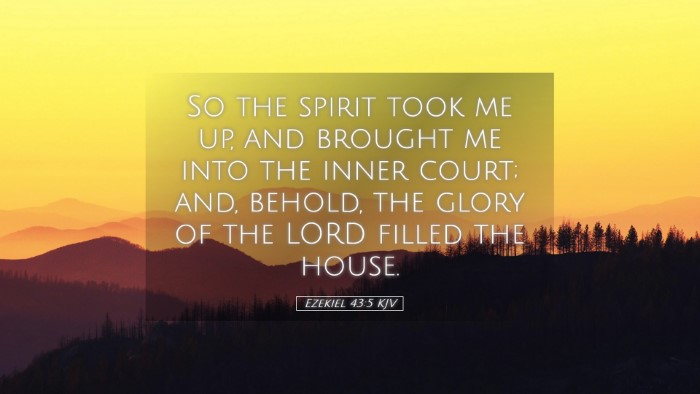Ezekiel 43:5 - Commentary and Insights
Bible Verse: “So the Spirit took me up and brought me into the inner court; and behold, the glory of the LORD filled the temple.”
Introduction
The passage of Ezekiel 43:5 occurs at a pivotal moment in the prophet's vision. Here, the return of God's glory to the temple signifies a restoration that is both physical and spiritual. This commentary draws insights from various esteemed public domain commentaries to explore the deep implications of this verse.
Contextual Background
Ezekiel prophesies during the Babylonian exile, a time of great despair for Israel. His visions often emphasize themes of judgment, restoration, and the promise of a new covenant. In chapters preceding 43, Ezekiel provides detailed descriptions of the new temple and the roles of the priesthood. Chapters 40-48 are heavily focused on the new temple vision, which represents not just a physical place of worship, but a renewed relationship between God and His people.
Interpretation of the Verse
Matthew Henry’s Commentary
Matthew Henry notes that the "Spirit" signifies the divine influence that transported Ezekiel. The term "inner court" underscores the sacredness of the space where God’s presence is revealed. According to Henry, the glory of the Lord filling the temple represents a manifestation of God's favor and the culmination of prophetic promise to restore Israel.
Albert Barnes’ Perspective
Albert Barnes emphasizes the significance of the glory of the LORD as both a returning presence and a transformative power. He discusses how the “filling” of the temple indicates God’s intimate relationship with His people. Barnes posits that this filling symbolizes not only the restoration of the temple but also the restoration of the people to a state of holiness and divine purpose.
Adam Clarke’s Insights
Adam Clarke offers a more critical examination of the phrase “the Spirit took me up.” He reflects on the nature of divine revelation through visions and stresses that this experience was more than a physical transportation; it was a spiritual elevation to perceive the divine reality of God’s glory. Clarke also notes the assurance this gave to Israel, suggesting that the presence of God was indeed a promise of peace amid turmoil.
Theological Implications
- The Nature of Divine Presence: The filling of the temple with God's glory illustrates the theme of God dwelling among His people. This is integral to understanding God’s desire for relational intimacy.
- Symbolism of Restoration: The passage symbolizes the restoration of Israel not just in a sociopolitical sense but spiritually. The glory returning signifies hope for both the people and their worship.
- Eschatological Significance: Many scholars view this verse as prophetic of a future time when God will restore His presence in fullness, drawing parallels with the New Testament revelations of Christ's indwelling Spirit.
Applications for Believers
This verse encourages believers to recognize and pursue the presence of God in their lives. The glory filling the temple can be seen as a metaphor for the believer's heart, inviting reflection on personal spirituality and worship.
- Seeking Divine Presence: Just as the temple was designed to be filled with God's glory, so should our lives and communities reflect His presence.
- Understanding Restoration: Believers can draw from this text the assurance that despite circumstances, God can restore and redeem.
- Living as the Temple: 1 Corinthians 6:19 reminds us that believers are temples of the Holy Spirit, calling for a life that is holy and aligned with God’s will.
Conclusion
Ezekiel 43:5 serves as a profound reminder of God’s unyielding faithfulness to His people. The return of His glory to the temple is not merely a historical event but a living promise that encourages believers to seek God's presence in their lives and communities. By examining the insights presented by Matthew Henry, Albert Barnes, and Adam Clarke, we are invited to reflect on our own spiritual journey in light of this transformative truth.


